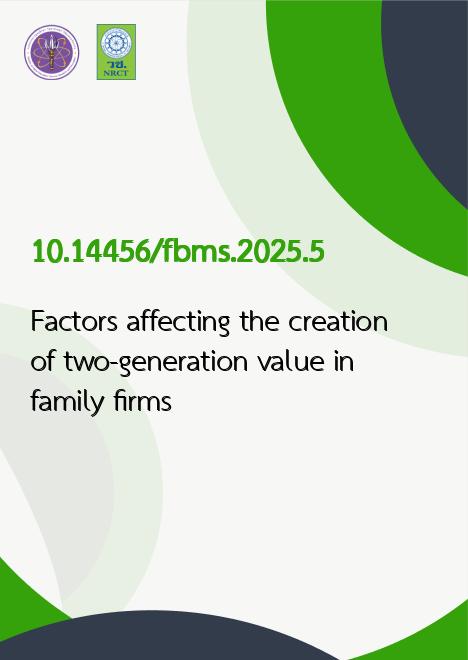
|
Factors affecting the creation of two-generation value in family firms |
|---|---|
| รหัสดีโอไอ | |
| Creator | Maryam Vajdi Vahid |
| Title | Factors affecting the creation of two-generation value in family firms |
| Contributor | Jahangir Yadollahi Farsi, Kamal Sakhdari, Mehran Rezvani |
| Publisher | University of the Thai Chamber of Commerce |
| Publication Year | 2568 |
| Journal Title | Journal of Family Business and Management Studies |
| Journal Vol. | 17 |
| Journal No. | 1 |
| Page no. | 79-116 |
| Keyword | G1, G2, knowledge, resources, value creation, family firms |
| URL Website | www.fbmsjournal.com |
| Website title | fbmsjournal |
| ISSN | 2821-9643(online) |
| Abstract | The value creation of family firms is not only influenced by factors related to the company, but also related to the characteristics of the first and second generation managers. Few researches have attempted to address the factors affecting value creation with two-generation management. Therefore, the construct of "5 management levers that activate new value creation including vision, goals and strategies, structures and systems; allocation of resources; learning and knowledge management tools and corporate culture (Crossan, 2010) at the corporate level and two-generational participation at the family level used. To Identification factors affecting the creation of value, qualitative narrative review and case study using semi structured interviews used. The data analyzed using an analytical method of Strauss Corbin systematic grounded theory. The findings of this research show that the arrival of the new generation, the relationship between the two generations, and creating motivation and commitment to change in G1 is an important factor in value creation. G2 provides the basis for creating new value due to its risk-taking and external learning tendency. 5 managerial levers of using new sources of social and human capital of G2 and experts, creating a long-term vision of continuing the business for the next generations, creating an innovative culture for business, creating motivation and risk-taking in G1, using structures and systems that encourage innovation, using G2 in management and accepting the opinions of G2, and creating ideas with the participation of two generations and using learning and knowledge management tools recognized as effective factors in creating two-generation value. Also, consolidation and integration of internal tacit knowledge of G1 and explicit external knowledge of G2, absorptive capacity of G2 and experts, consolidation and exchange of knowledge between two generations were recognized as effective learning and knowledge management tools in value creation. |
